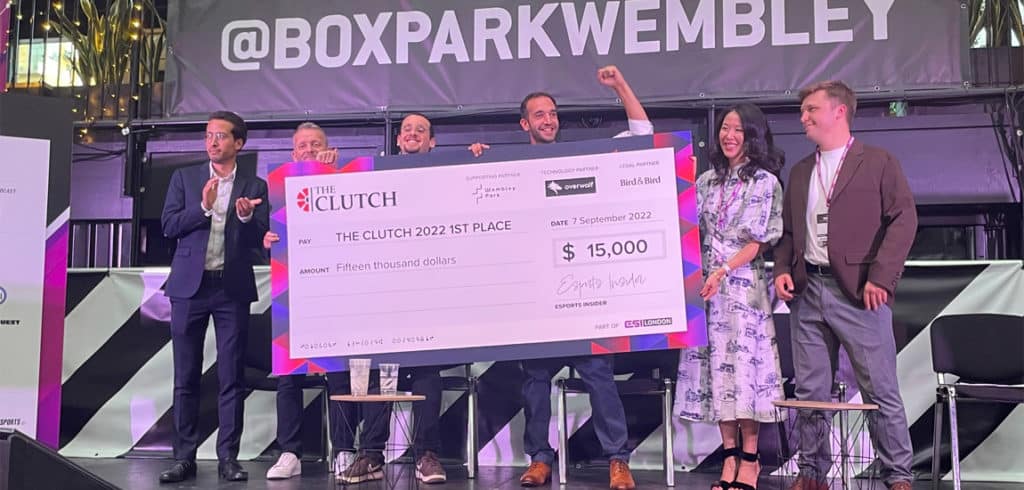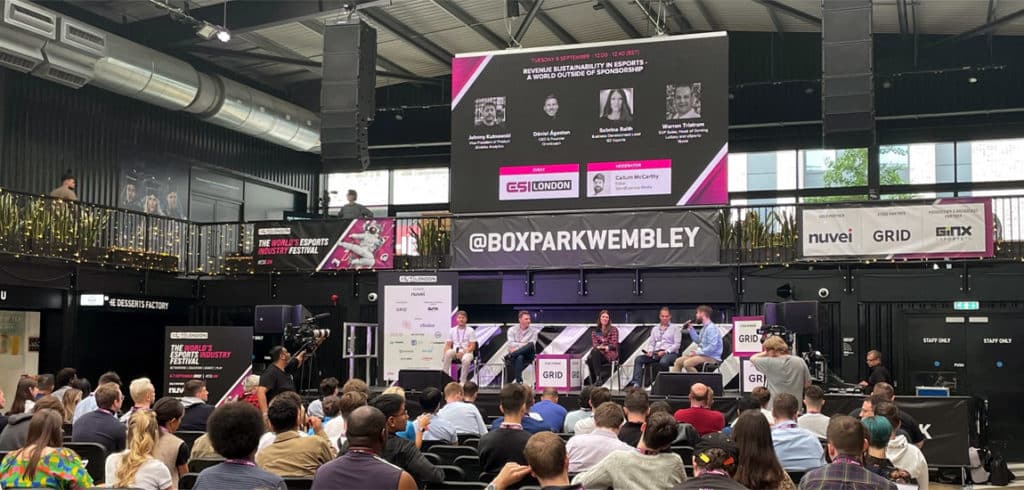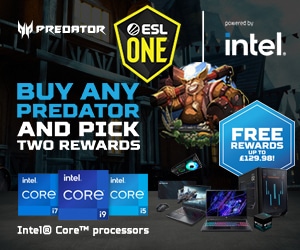Esports industry conference ESI London 2022 took place at Boxpark Wembley this week, and Jack ‘Jackelbat’ Freeman, Joshua ‘Jace’ Sharp and Dom Sacco provide a recap from event media partner Esports News UK.
ESI Hall of Fame 2022 winners announced including Epic.LAN founder
To open proceedings, the Hall of Fame evening took place on Monday September 5th 2022 at Platform Bar in London.
Industry members gathered for networking drinks and several were recognised in the ESI Hall of Fame which returned for 2022.
Epic.LAN founder and MD Jon Winkle received the Community Champion award, a well-deserved accolade for his support of the esports community with his work hosting LAN and other events throughout the year, while keeping things like ticket prices affordable for the scene.
Elsewhere, Telmo Silva of Grow Up Esports won the youth champion award, saying: “I want to dedicate this to other people who believed in me and supported me over the years, to my wife and my children.”
Dominika Szot, head of brand strategy at Grid Esports, was named rising industry star, while Matthieu Dallon of Trust Esport received the ESI Hall of Famer 2022 accolade.
Mouseskins wins The Clutch investment competition

UK-based custom gaming mice provider Mouseskins received the first-place prize in the Clutch pitch investment competition, where fundraising companies have a few minutes to pitch to a panel of investors on stage.
They won $15,000, a trip to Tel Aviv with Overwolf and a year’s access to Barclay’s Eagle Labs. There’s more info on the Clutch 2022 investment competition in the announcement here.
Other companies that were recognised in the competition included ProTest Labs (second place, receiving $7,000), Challenger Project (third place, $3,000) and Versus Gaming.
Kesem Fine, business development manager at Overwolf, commented: “I’m really happy with how The Clutch turned out, all the finalists pitches were great, and it was not an easy decision for the judges. In the end, Steven from Mouseskins was our pick for this year’s winner, and it’s very well deserved. Steven has been hard at work for years bootstrapping Mouseskins. His grit, enthusiasm, and get it done attitude can definitely be felt. I’m looking forward to working together in person for our week-long acceleration in Tel Aviv.”
6 highlights from conference panels at ESI London 2022
In ‘the esports team identity conundrum’, the regional identity of a team was explored, including regional fans.
President and COO of Team Liquid, Claire Hungate, said: “I think it’s a challenge for everyone -not having that locality with teams. What we’re trying to create is tribal fandom. […] It’s to get someone to say “I’m a fan of Team Liquid” and to put that on their Twitter handle, to get them to really care about your brand. That’s what makes them the difference between super fan and a casual fan, that’s what makes them valuable.”
Alliance chief strategy officer Kelly Ong admitted that Alliance lost regional fans and sponsors when transitioning from a Nordic fanbase to a global brand.
Founder and CEO of Hotdrop, Heather Dower, summarised by saying:
“There’s kind of a set expectation that you have to have a physical office, you have to have sponsors, you’ve got to have a content production, and actually, no. Foster the talent and environment and go from there and just ensure that we have grassroots, because without grassroots it won’t continue as an industry.”
Heather Dower, Hotdrop
This idea of location was also explored in ‘how esports offers destinations a major opportunity’, with London & Partners’ head of major events and city experience, Wayne Sullivan, saying that they’re doing a lot of work pushing London as a destination for esports, with “changes coming” and to “watch this space”.
Speaking of London and the UK, our editor Dom Sacco moderated a panel on ‘the UK esports scene’, featuring ODEE from London Royal Ravens, Nick Williams from DotX Talent, Karen Low from The Story Mob and David Jackson from NUEL. This panel discussed the current state of UK esports based on some of the points in an upcoming report written by Dom Sacco on behalf of Ukie and working with The Story Mob and YouGov, which will be released in October.
It opened up with a discussion about the influencer market in the UK and how it’s much smaller in comparison to American based streamers as well the lack of UK competitive players.
In regards to government support, Chief Gaming Officer at Infinite Esports, Michael ‘ODEE’ O’Dell had this to say: “To me the simplest thing our government can do is create esports SIC codes […] it means the government can go, “okay, how much revenue does esports actually generate?”
On the collegiate scene, David Jackson, NUEL MD, said: “You’ve got students increasingly making inroads with the universities themselves. I think Warwick [recently nominated in the Esports Awards] are actually a fantastic example of that, where they’ve actually got university buy in and for their esports centre which has come largely down to people like Jack Fenton [head of esports at the University of Warwick] and the people in his team to continually push that.”
On the point of collegiate esports, ‘US vs UK: the university esports experience’ saw Jack Fenton, as well as co-founder of NUEL’s Women & Non-Binary LoL tournament, Anisah Munim, and Joey Gawrysiak, director and professor of esports at Shenandoah University, converse.
Anisah said:
“I don’t think criticism of esports degrees is esports-specific, especially in the UK. I think there’s a massive discourse on mickey mouse degrees. I think when people see degrees that aren’t necessarily STEM, they’ll say, ‘oh you don’t have an obvious career path’, I think it’s criticism for a degree [in general]. People don’t always see the career paths you’ll get in esports.”
Anisah Munim
“I studied languages, a lot of people come up to me sand say, ‘oh you’re going to become a translator, right?’ No, that’s the complete opposite of what I want to do.” (Sorry Anisah! – Dom)
Jack added that it comes back to culture. “I studied linguistics and wrote my whole degree on esports and high level team communication, which led to coaching opportunities,” he said. “Five years later, I’m here. It’s about seeing university as an opportunity to do more.”
Professor Gawrysiak spoke at length about the collegiate system for esports in the US, taking from their successful programs in traditional sports that help colleges feed talent into the NBA, MLB etc. All the panellists referred back to cultural differences surrounding collegiate esports as to why the contrasting methodologies worked in their current environment.
In ‘good foundations – localised and accessible infrastructure is the key to esports’ future’, the panel delved into the challenges that are facing potential players and upcoming stars in terms of opportunities to play and compete.
They suggested that the first steps would always be providing the necessary equipment. However, it would also be necessary to create a community.
In relation to this, UK Gaming and Esports Marketing Specialist at Intel UK, Mark Broom talked about the Intel FutureGen program with NSE.
When discussing solutions for greater accessibility the main suggestions were providing equipment, engaging tournament design and knowledge amongst the player base. The conversation led to the topic of grassroots esports which the panellists agreed was a key factor.
Competitive experience manager (EMEA) at Riot Games, Jon Tilbury, emphasised: “It’s (as we’ve always been saying) critically important to then help with everything [in grassroot competitions]. And then there are brands and partners like Intel, who see the value in grassroots competitions and see that there’s especially space for improvement.”
In ‘what web3 brings to esports’, the panel here got rather heated, demonstrating the divide there is in the community around the metaverse and NFTs and their involvement in esports.
Warren Lincoln from Reality+ made a good point about the younger generation.
“Don’t underestimate children,” he said. “They’re becoming very native around crypto. VBucks, EA Points, these aren’t things they can use or transact outside of the games they’re playing, but they’re already becoming very aware in large-scale metaverses, what their impact means.
“If they’re becoming native at a young age – my daughter is nine and knows more than me – then what we’re trying to do is address that user adoption for people closer to our age. There are also economic downturn factors outside of this stage. Workshops and social media will help drive wider awareness at why decentralised communities are interesting and decentralised crypto and digital currency can be a force for good.”
Amanpreet Singh questioned how many people actually want crypto and have wallets, and spoke about the barriers to adoption in the space.
In ‘building your presence in esports’, Perhaps the most eye-opening talk for me was the panel focused around building a presence within the esports space featuring Guillaume Vergnas of Alpine F1 and Maja Sand-Grimnitz of Epos Audio.
Both of them pushed this idea that esports can very easily connect itself to the wider industries. Vergnas spoke about the sim racing technology used by Alpine as a means of drawing people into motorsport and unearthing talent that financially could never make that first step.

Dom is an award-winning writer and finalist of the Esports Journalist of the Year 2023 award. He graduated from Bournemouth University with a 2:1 degree in Multi-Media Journalism in 2007.
As a long-time gamer having first picked up the NES controller in the late ’80s, he has written for a range of publications including GamesTM, Nintendo Official Magazine, industry publication MCV and others. He worked as head of content for the British Esports Federation up until February 2021, when he stepped back to work full-time on Esports News UK and offer esports consultancy and freelance services. Note: Dom still produces the British Esports newsletter on a freelance basis, so our coverage of British Esports is always kept simple – usually just covering the occasional press release – because of this conflict of interest.



